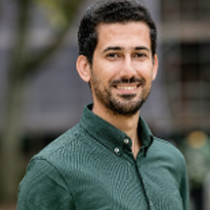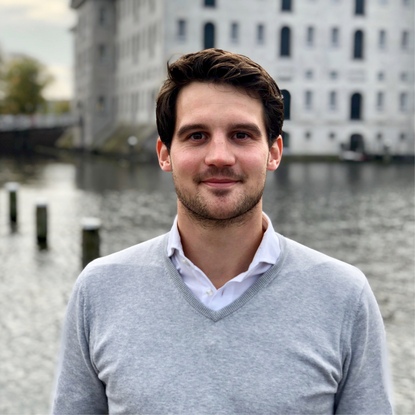This article was originally written and published by TU Delft, where hundreds of scientists dedicate their time and expertise to reducing our energy use. Three of the PhD students in the article are working with AMS Institute on ALIGN4energy and JustPrepare.
All four students, from the Faculty of Architecture and the Built Environment, focus on housing. Three cover the most prevalent types: homeowner associations (Ragy Elgendy), social housing (Stefanie Horian), and individual ownership (Ladislav Krutisch). The fourth, Diletta Ricci, specifically researches how to help vulnerable neighbourhoods.
From left to right: Ladislav Krutisch, Ragy Elgendy, Diletta Ricci, and Stefanie Horian.
Ragy: bring communication strategies and professional guides
Ragy is part of project CondoReno, which aims to accelerate energy renovations by Homeowner Associations (Dutch: VvE’s). Ragy structured the renovations into four key phases: getting everyone on board, creating a master plan, getting the finances in order, and performing the actual work.
“I mapped barriers along this path which can delay or derail the project. The sheer number of roles and stakeholders surprised me, as well as the importance of social dynamics: inhabitants often get overwhelmed by the amount of information or spooked by the costs, leading to low confidence and no-votes.”
“Communication strategies by renovation companies can prevent conflict within the VvE’s. Guide residents through the process by clearly indicating the costs and stakeholders involved at each step.”
Ragy Elgendy, PhD student at TU Delft

He now sees the advantage of integrated service providers: intermediaries which handle the entire home renovation. Alternatively, some EU countries attach advisors to renovation projects to help the VvE’s overcome financial, regulatory, and social hurdles. “It seems a large investment, but there are incentives and loan programs at the local, national, and EU level. Because energy renovations improve efficiency, reduce costs, reduce CO2 emissions, and result in healthier citizens.”
Stefanie: support difficult decisions, minimize transaction costs
Stefanie is part of the ALIGN4energy project, focusing on climate neutrality and decarbonization in Dutch social housing. She surveys tenants’ and categorizes them into personas, each with different priorities and needs. Further, she interviews experts in housing associations and related stakeholders to investigate the hurdles during energy renovations. “By integrating behavioural insights into transaction cost theory, my research shows that the struggles of renovation in this sector are beyond financial: they relate to, for example, time, effort, and behaviour of personas.” Stefanie aims to inform policymakers and suggest effective incentives for renovation.
The lessons so far
During her research, Stefanie was surprised to find that even seasoned professionals struggle with the complexity of renovation.
““It shows the urgency of developing frameworks to support effective and efficient decision-making, especially around minimizing transaction costs.””
Stefanie Horian, PhD student at TU Delft working with ALIGN4energy

She realises that the energy transition is not merely about technological progress or financial investment: “since most stakeholders are eager to accelerate decarbonization, the greatest challenge seems to be the social transition.” Stefanie is determined to contribute with her research. “Residents of social housing are both highly diverse and often vulnerable to energy poverty. By focussing on this group, I want to ensure that no one is left behind.”
Ladislav: reduce friction, increase financial literacy
Ladislav, also part of ALIGN4energy, works to better understand the psychology behind homeowners’ decision to renovate. “About 90% of Dutch houses are gas-heated, which goes against both national and EU climate goals. But the government cannot force homeowners to renovate: we have to convince residents using tailored approaches.” Like Stefanie, he combines surveys of residents with interviews of experts in research and practice.
“I try to find which factors explain frictions or barriers in the renovation process: psychological, social, economic... how are the experts handling these challenges, and how can we reduce these frictions?”
Ladislav Krutisch, PhD student at TU Delft working with ALIGN4energy

The lessons so far
A surprising finding is that certain groups of homeowners are indifferent to, for example, environmental arguments, but still choose to renovate. “Upfront cost is usually the main barrier, even though trends in energy and gas prices suggest that any type of energy renovation is a sound investment in the long run.” Therefore, Ladislav suggests increasing financial literacy as a possible strategy. He also sees a role for the faculty: “We are so focussed on new construction, even when a strong majority of buildings currently in the EU will last until at least 2050! Architecture students should learn how to adapt, renovate, and maintain these structures.”
Diletta: listen to, include, and improve the lives of residents
While her three colleagues cover the main forms of housing, Diletta’s project JustPrepare helps the energy transition of vulnerable Dutch neighbourhoods in a socially responsible manner. “Vulnerability can refer to residents’ health or socio-economic state, but also to urban deficits or low energy ratings of homes.” She attempts to incorporate social criteria in technical decisions: determining which combination of renovation measures is fitting for each situation.
“There are national funds specifically for these neighbourhoods. How do we apply them without generating mistrust or frustration?”
Diletta Ricci, PhD student at TU Delft working with JustPrepare

The lessons so far
Like many experts, Diletta used to focus on the results of renovation. “But the process is highly disruptive to residents! Their approval hinges on empowerment and inclusion of their needs and wishes.” That is why JustPrepare insists on recognition (learn about the residents), procedure (include them in the process), and distribution (ensure that the results improve their lives). Diletta found that conspicuous improvements to living spaces are crucial to gaining approval: “for example, more daylight, improved air quality, or new shared spaces for social activities.” Whereas installing efficient but highly complex energy systems, without properly explaining why or how to use them, might lead to misunderstanding and resentment.
Read more about the overarching research projects that AMS Institute and TU Delft collaborate one: ALIGN4energy (Stefanie and Ladislav), and JustPrepare (Diletta).
All images in this article by Annelies van ‘t Hul
